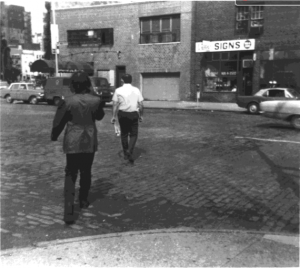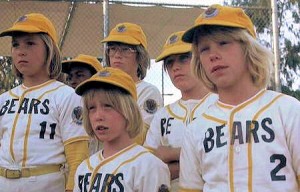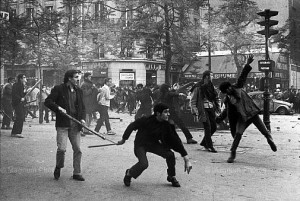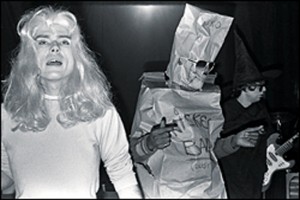Random
No Thanks: A Simple Wish for the Ends of Alt Lit
Last week I watched Nathan Staplegun eat salted peanuts on spreecast. What started off as Nathan eating salted peanuts soon turned into Nathan asking his roommates or friends (and thus turning the computer camera in their direction) what they were preparing in the kitchen, and quickly became a spreecast showing one of Nathan’s online friends playing guitar. On the surface, Nathan Staplegun eating salted peanuts on television (that’s what platforms such as spreecast are: do-it-yourself TV) would seem like a snooze, a no-brainer, an excuse to read more books. But, what Nathan did was really great. He put on TV a thing that he would have done anyway and by doing it on TV turned the act of eating salted peanuts into something else: an event, perhaps.
I love to tell the story of Glenn O’Brien’s TV Party. In 1978, Glenn O’Brien and friends (and his friends were people like Jean-Michel Basquiat, Amos Poe, Deborah Harry, Walter Steding, Chris Stein) got together and decided to take advantage of public access cable television in New York City. The format was simple: hang out with friends, get high (one episode had Fab Five Freddy in costume teaching viewers how to roll perfect joints), have your friends play music, and talk to people (viewers called in live while the show was on air and used their short time to make death threats and complain about how shitty the show was). By television’s standards, the TV Party shows were shitty, but they were fun to watch. And, in their own way, became increasingly popular (special guests included David Byrne, Klaus Nomi, and Mick Jones of The Clash) and influential (in one of his early top ten lists David Letterman cited TV Party as an influence). Art and everyday life will never be separate things; although, the art marketers sure seem to want us to believe that they are. Friends get together, record each other doing silly things, or someone we hardly know broadcasts himself washing dishes or whatever, and art’s possibility is renewed, if not, realized.

The word ‘creepy’ has not always had negative connotations. Vito Acconci follows people around New York City as part of his month-long performance ‘Following Piece’.
I have been kicking around the idea of starting a series of posts in which I cruise my facebook friends’ facebook photos and post the ones I like as part of ‘Creeper: Favorite Facebook Photos of My Facebook Friends’. The word ‘creep’ (and its variations) has not always had negative connotations. When Radiohead hit the pop charts in 1992 with their debut single “Creep” the song seemed like a strange, wonderful call to embrace the pathos of a loser, a lost subcultural weirdo whose dreams and desires are too much for himself and the world. Much like Beck’s “Loser” the song seemed to reinvigorate a long-standing yet dangerous tradition in the arts: the elevation of the low, the loser, the outsider, the emotional clown, to the status of cultural barometer, of artist. Long-standing because American cultural producers had carefully exploited this type for profit since the early days of white rock ‘n’ roll (Elvis Presley) and the first teen films (Rebel Without A Cause). Dangerous because sometimes people actually believed in these characterizations enough to begin to act like rebels, not satisfied with merely listening to them on the radio or watching them at the movies.

It’s not Dennis Cooper’s male escorts of the month. It’s The Bad News Bears (1976), who demonstrated that life sometimes artfully happens when a bunch of losers get together and push the game to its limits.
In 1969, Vito Acconci made art by simply following people around New York City. Acconci spotted someone on the street and followed them until they disappeared into a place he couldn’t, or didn’t, want to go. Acconci’s performance lasted almost a month. He’d get up, go outside, spot someone, and follow. Most spreecasts, for better or for worse, go on way too long. But, so does hanging out with one’s friends. At some point, you want to be by yourself or hang out with someone else. With the advent of the spreecast you can hang out with people you know or don’t know or want to know simply by joining in. It’s the logic of the club but not as restrictive. Of course, hanging out on spreecasts may never beat the intimacy of being in the same room with a friend or a loved one or turning it all off and reading a book. But I’ve known a lot of people who got all the companionship they needed by simply watching episodes of Breaking Bad or whatever–and apparently, according to some, you can be plugged in and still experience solitude.
This isn’t a plug for spreecast, who I could give two fucks about. It is a plug for a kind of art that denies the art market and realizes itself in everyday life. One doesn’t need an important architectural group, a big publisher, and a major museum to support an effort to follow and document people in your neighbor (although Acconci had all of those). One does need ideas. I was talking to Elizabeth Emily D’Agostino in her car about art. We were parked outside my apartment–a perfect venue to discuss anything. Our conversation shifted to cultural amnesia, an easy target. In our desperate efforts to predict the future I described for her a story written by Tao Lin and boldly proclaimed that this was Lin’s crowning moment and that history would look at this moment as an opportunity lost. The story is simple enough:
when i was five
i went fishing with my family
my dad caught a turtle
my mom caught a snapper
my brother caught a crab
i caught a whale
that night we ate crab
the next night we ate turtle
the next night we ate snapper
the next night we ate whale [. . .]
The last line of the story is repeated almost endlessly or as long as the writer/reader can endure it. Although, I have read a version of it where it ends rather abruptly. For a video account of its hilarity, you can listen to Tao read it here.
Why an opportunity lost? Because when an artist with the talent of Tao Lin comes along he seems to come with a two-pronged fork capable of reflecting the zeigeist back to us and/or breaking the hold the zeigeist has on our attitudes, desires, fashions, discourses, etc. In the post-Warholian world in which we live contemporary artists have made it clear that they are more interested in and perhaps more capable of showing us who they are (i.e. reflecting the ‘zeigeist’ back to us) than breaking the mirrors that bind us to a social-medial and political-economic worldview that reinforces the notion that ‘we’re fucked.’

May 1968, France. Today, the attitudes and aspirations of the ‘me generation’ of the 1970s have resurfaced in the attitudes and aspirations of millennial artists.
We are fucked. In Sheila Heti’s novel, How Should a Person Be?, someone comes up with an idea for an ugly painting competition. I say ‘someone’ because not even Sheila, our narrator, knows who came up with the idea. The idea of making the ugliest painting is more difficult than you’d think. Relationships are ended, lives are changed. During the height of the national crisis that was punk rock in England in the 1970s, a roadie for The Who dismissed the movement as a mere ‘revolt of the uglies.’ I mean, imagine calling a bunch of teenagers parading their misfortunes, economic hardships, childhood traumas, bad skin, social awkwardnesses, and fashion made of actual garbage found in the street as revolting or, worse, ugly? It is with these two sentiments in mind–a conceptual call to ugliness in the name of something else (Heti) and its celebration as an insult (punks)–that I invoke the writers and artists of the alt lit movement, a movement that has come to signify everything that’s right and wrong about everything that’s fast, cheap, and out-of-control in the arts today. Perhaps the time has come to break the mirrors that bind us to our own little personal victories (i.e. ‘I’m internet famous’) and begin the more fun and difficult work of smashing those fucking mirrors so that we–and the big, bad world–may see ourselves again, as something else, something more, something seemingly uglier and thus, perhaps, more beautiful. Of course, you could choose to ignore me (I’m used to it, really)–your career path probably profiting more from it–than listen to me whisper to you, from the salted peanut gallery.
@janeysmithkills
kottonkandyklouds.tumblr.com
Tags: Alt Lit, art, Beck, Brad Pitt, Chris Stein, creep, creepy, David Byrne, David Letterman, Deborah Harry, Dennis Cooper, Fab Five Freddy, facebook, Glenn O'Brien, jean michel basquiat, Klaus Nomi, loser, Nathan Staplegun, post-Warhol, punk, Radiohead, salted peanuts, sheila heti, spreecast, Tao Lin, The Bad News Bears, The Who, TV Party, Vito Acconci, Walter Steding, weirdo, whale, zeigesit



The old masters fill me with feeling, but alt lit is often lacking and bite-sized. Perhaps I’ll just capitulate to being unhip and uncool and unwhateverpersonalbrand.
this is great. love tv party. curious as to how you see other social-based conceptual art practices playing into this (sophie calle, tracey emin, ray johnson whipping himself with belt, running around with chalkboard, etc.). are you suggesting “alt lit” is more of an outgrowth of that tradition
i feel like alt lit writers and artists have, consciously or not, redefined and redirected affects and attitudes toward seemingly ‘small’ feelings and the ‘little’ things in life. Branding seems more complicated. On the one hand, it seems to be used as a joke. On the other, it is taken seriously. And sometimes, both. I feel like the days and nights of making grand narratives are over and, for the time being, i feel like small is the new big. This doesn’t mean that we shouldn’t read writers/artists who were doing wonderful things before we were born.
i feel like certain alt lit writers/artists are an outgrowth of the tradition you are alluding to. but my simple wish is for alt lit writers/artists to seize the moment and continue to make fun, invigorating, and dangerous art. i feel like alt lit writer/artist people in general seem super timid of rejection in the face of risk and yet the ones who risk the most tend to receive the most critical attention. yeah, spreecasting yourself removing your belt and whipping a cardboard box while hopping around on one foot belongs to alt lit as much as alt lit belongs to it.
True story: the original Monkeybicycle version of the poem is supposed to repeat the line “and the next night we ate whale” 5000 times because the largest whale is 5000X larger than a sea turtle. When Tao sent it to me, I asked if he’d let me add more “and the next night”s so it could be sort of accurate.
The small moments in life are the things worth living for.
and worth writing about and making art from
“It’s not Dennis Cooper’s male escorts of the month. It’s The Bad News Bears (1976)”
hahahaha
idgi
And but: big, non-everyday things are also made out of everyday things. And a big thing (maybe Infinite Jest in a good way and Matthew Barney’s films in a bad way) always (either intentionally or not) tell us that you can pile as many small things together as you want but they don’t add up, and often contradict each other. I want writing, alt lit or not, that doesn’t add up. I’m not capable of doing this because I’m stuck wandering in a weird DMZ between alt lit and mainstream except for my book of pie charts, but I strive for small things that don’t add up, and big things that don’t add up, and anything where the math is left undone and unfinished so you get to decide how to do the adding and subtracting and multiplication in your everyday life.
So I’m sort of naive and want the impossible but it sometimes happens, like Infinite Jest or Janice Lee’s Damnation or Matias Viegener’s 2500 Random Things About Me, Too etc. where getting told you have to figure it out for yourself is akin to getting a big hug. I want to encounter work and make work where even ugliness is too special and all you’re left with are massive jigsaw puzzles and self-conscious spectacle and nervous laughter, because that’s what everyday life is like.
yeah–i love matias’ book, which, for me, is always next to my bed–multiplicity, confusion, mystery, impossibility, things that don’t add up, brought me to writing, poetry, art, etc–life may be puzzling, it may be made up of whatever it is you’re going through, and the ‘small’, ‘everyday’ things are not excluded from wallace’s writings nor barney’s films–however, i feel if you turn to alt lit to seek explorations of rawl’s notion of justice, you might be looking in the wrong place–whereas, if you look to alt lit for writing about kind of not falling in love in a taco bell while sort of wondering how you’re going to pay your rent and questioning the nail polish you put on that morning while the cat was puking, you might find a place where emotions are a lot less ontological, accounts of experience that are not thought through and richly incomplete, language seemingly superficial and liminal and puzzling, something perhaps closer to what your comment seeks–i don’t know :)
I’m looking for the latter, though my concerns are sort of lofty right now because of an involved thing dovetailing doubt and belief I won’t get into, except I want to be able to doubt what I read and believe it at the same time, I guess. And I try to get there as a writer and artist but I never make it, I end up with books of sad people arguing with each other at great length or books of language poetry that include a lot of Yiddish and hate mail or paintings of pie charts, stuff that fails, but doesn’t fail in the way I want it to fail.
i liked those videos of zachary german eating cake etc
me too
There’s a reason why people think American culture is vapid as fuck. I think there is a contradiction in seizing the moment in order to mirror the lack of profundity in contemporary life. I mean why not elevate instead of mirror the stupid shit people do… like salty peanuts by dizzy gillespie elevated the banal and transformed it… capturing the banal doesn’t transform shit. Doesnt create change. Doesnt create revolution or inspire or awe. It comforts and dulls like a drug. Like bad tv.
There’s “small is the new big” (e.g. Carver [like him or not]) then there’s “small is small.”
Nothing wrong with liking small, of course, whether it’s big-small or small-small.
right–did you read the post or are you pissed because you agree with me and instead of taking the time to say it yourself you stumbled across me saying what you wanted to say–read the article again slowly–i am not making the case that you seem to feel i am making–the banal contradictory vapid superficial imitative stupid shitty stuff that may or may not constitute moments of everyday life (and which i believe should be seized and used to make something else) are indeed the stuff of which revolutions are made–in other words, the extraordinary is always internal to the ordinary–does that make sense–now, if you want to get high (i.e. elevate) i’ve got your bong right here
That’s a fine way to put the perspective, and a useful lever in the argument.
A point of view to rival this deconstruction of ‘extraordinary’ (or ‘lofty ambition’ or so on) would be to preserve the distinction: to say that there’s things not ordinary – and valuable, ‘making of “value”‘, because they’re extraordinary.
Maybe ‘unusually ugly’ or ‘unusually obnoxious’ or ‘disruptive of normality to the point of revolution’…
–but only maybe, right? EVERYTHING crappy isn’t transformative, however much some particular crappy thing might be.
Two questions:
a) I get that comfort is destructive, bad, an enemy. But what is wrong with it? What’s wrong with a little sleep, a little unconsciousness of others, a bit of conservatism-that-really-conserves? Isn’t a frenzy for emergency also a kind of lotus-eating?
b) Embracing the values of ugliness or smallness-of-scope, how is quality sought or discovered or determined? In alt lit, for example: how does a participant make the good stuff, and an aficionado argue for it and tell it from the bad? And if the, what, gist or goal is, in part, to revolutionize ‘quality’, how does one tell that from thrashing Brownian motion – from dull kiddie shit?
You know King Lear?
The dad’s wheels are a little loosely bolted on, and he gives all his shit away to his three daughters on the proviso that they each tell him how much they love him. One of them – his favorite – goes on her own power trip by saying “nothing”, and her superficially honest and deeply manipulative negation deranges him. Their world dies, and for the living world to regenerate, it costs life.
So far, so ordinary: family = bribery + extortion . Everyday life!
But when you read (or see) it, it’s not ordinary. Its extraordinary success is that it’s failure –– your failure. You die, and as you leave the theater, you’re hatching anew, transformed.
Don’t know if Shakespeare was trying to do that; I think he probably was. Definitely, he was trying to make people feel good about giving him their $.
If there’s a method, I’ve never knowingly seen it laid out.
“I have been kicking around the idea of starting a series of posts in which I cruise my facebook friends’ facebook photos and post the ones I like as part of ‘Creeper: Favorite Facebook Photos of My Facebook Friends’.”
you might be interested in a similar performance thing I did where I invited all of my Facebook friends to a live Google Hangout to watch me take screenshots of their profile pictures. Slowly uploading the photos to:
closeupsofmyfriends dot tumblr dot com
the site also links to the archived video of the piece. was thinking of similar reference points: the Acconci following piece and hanging out “too long”
find this a little befuddling considering your insistence on introducing me using the term “alt lit” at several readings despite my general reluctance/aversion, your interest in listing out categories of ‘people’ [women] that were/are distinctly “alt lit”. spreecasts are boring to me because watching people on cam is boring. other people might like that, thats fine. not interesting to me. trying to find just a smidge of free time like take a walk, or draw something or make a chart or read about tv on the internet…but thats just my bag. i remember acconci being a nefarious jerk i think?
lovingly
lucy
i feel like I have read your poetry a little bit more closely than you have read my article–if you have an issue with how i have introduced you at readings then let me know (in fact, at the 851 reading i did not mention your involvement with alt lit even though i did mention it on the facebook event page–i got the message)–there are a lot of things i feel are boring: photos of one’s cat, photos of oneself trying to look pretty or cute or worse ‘sexy’, but internal to those feelings i try to find something else and that too is what this article is about–it’s funny, when i approached you about doing a thing about you and other women writers in the alt lit thing, you were into it–should i retract that?
love is boring,
janey
just genuinely confused by what i read as mixed messages. i was into it and still am, because while i dont self identify as “Alt lit” i have inarguably received support from people that do or once did… i am interested in women writers because i am interested in writers/writing. dont feel anything esp strong neg or pos about “alt lit”. thing about photos seems weird/personal… feel fine about posting boring things on the internet… not everythings for everyone… i get that… i am just not really sure who or what your article is trying to criticize, though i get the sense you aren’t purely shittalking it. just genuinely trying to understand what your attitude toward “alt lit”. someone told me once that being a literary critic is nothing like pointing and laughing. i’m trying to find a way to read this as something else.
love is everything to me…. i’m a really sincere person, i think… my interest in alt-lit is no different than my interest in any art. i want to read about other peoples experiences and express my own. i believe that text can express ways in which we are linked: namely, “love” or that most people feel that love is important and are compelled by it. i do not know your tone. i value you as a writer and person so i’m trying to understand i guess… that may be boring to you. just trying to understand.
Enjoyed reading this a great deal. I wonder though, what you mean by ‘the mirrors that bind us…’ It seems like these mirrors (media, etc) aren’t telling us ‘we’re fucked,’ but rather to seek further comfort and diversion through material and entertainment.